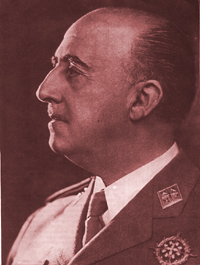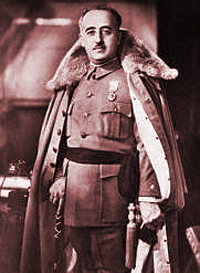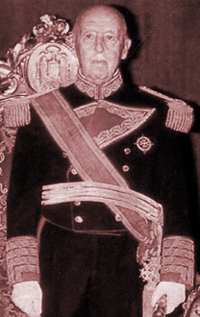
5 PESETAS COIN - SPAIN - FRANCISCO FRANCO
(KM 786)
Date: A.D. 1957
Obverse: Portrait head right - FRANCISCO FRANCO CAUDILLO DE ESPANA POR LA G.DE DIOS 1957
Reverse: Coat of arms and Francoist eagle - 5 PTAS UNA GRANDE LIBRE (Star with production year)
Engravers: Manuel Marin, Mariano Benlliure
|
FRANCISCO FRANCO CAUDILLO DE ESPANA POR LA G.DE DIOS / Francisco Franco Leader of Spain by the Grace of God Francisco Paulino Hermenegildo Teódulo Franco y Bahamonde was commonly known as Francisco Franco and he was the absolute ruler of Spain for 36 years. His official title was "The Leader of the Final Crusade and of the Hispanic World, The Leader of the War of Liberation Against Communism and Its Collaborators." Born on December 4, 1892, Franco rose to prominence in the army and after a stint in a military academy he was commissioned as a second lieutenant and sent to to help in the Spanish attempt to occupy Morocco. With heavy fighting and heavy losses came fast promotions for capable leaders. Franco proved himself a capable leader and a popular one as he led his men in bloody battle against the Moroccan resistance, badly wounded in a skirmish he eventually obtaining the rank of Colonel. After a brief stint as second-in-command of the Legión Extranjera (Spanish equivalent to the foreign legion) he was promoted to colonel and put in command of the first wave of the massive invasion that that would spell the end of the Republic of the Rif, the short lived nation started by Moroccan rebels who fought Spanish occupation. In 1926 at the ripe old age of 34 years old he became the youngest General in Spanish history. In his early years Franco was relatively apolitical and a revered war hero, these factors meant that he was favored by the leaders in all factions with many honors and high posts. He was placed in command of the army in Africa and held the post of Chief of the General Staff in both the Monarchy (which fell in 1931) and the shaky Republic that came after. Amid corruption and scandal in this new republic nothing could stop the clash between Conservatives and Nationalists, the Spanish Civil War erupted and Franco, after multiple attempts at trying to intervene and quell the unrest, finally choose the side of the Nationalists. After the death of the head of the Nationalist Party General José Sanjurjo Franco, being the most senior officer, was made commander and chief and led the Nationalist army towards Madrid, and with the help of Nazi Germany and Fascist Italy the Republican camp surrendered and the civil war ended April 1, 1939. Franco did not join the axis power but he did not shun them either, disagreement on terms kept him from choosing sides decisively and Spain mostly stayed out of conflicts in World War II, they had little to offer to the axis powers and the axis powers had more important fish to fry as long as he stayed relatively dormant. Spain even acted as an escape route for a large number of Jews fleeing persecution by the Nazis. After the war the hardened military man and national hero became a totalitarian leader who looked to control anything and everything that might transpire within his borders. He declared Spain a monarchy but appointed no monarch, he did not appoint himself but instead took the title of de facto regent. He wore the uniform of a captain general (a rank traditionally reserved for the King), his portrait appeared on most Spanish coins and he took the titles Jefe del Estado (Chief of State), and Generalísimo de los Ejércitos Españoles (Generalísimo of the Spanish Armed Forces). He enforced the use of the Spanish language only and his politics were a mixture of Roman Catholicism and conservative, traditionalist, rightist philosophy that became a typical, oppressive regime with heavy censorship. With armed military police he enforced strict adherence to conservative moral laws and oppressed all things he felt were not fit for public consumption. Although with age he softened a bit he continued to remain the undisputed ruler of Spain saying "Our regime is based on bayonets and blood, not on hypocritical elections." In 1969 he named Prince Juan Carlos de Borbón as his successor by-passing Juan Carlos's father, Don Juan, the Count of Barcelona, who had superiority. In 1973 Franco resigned as prime minister but remained head of the country and commander in chief of the military forces. Franco died on November 20, 1975, at the age of 82, he was succeeded by Juan Carlos. After helping to quell an attempted military coup by those who would take Franco's place and retain his style of government, Juan Carlos restored democracy. Since Franco's death almost all of the monuments to him have been removed. |



